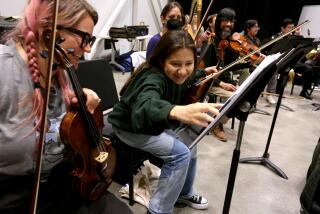ELOQUENT DESPITE THEATRICS : HALL CONDUCTS BRITTEN REQUIEM
- Share via
William Hall proved his affinity long ago for the gentle introspection, the bleak poetry, the timeless grandeur and the numbing pathos of Benjamin Britten’s “War Requiem.”
Sunday afternoon at Royce Hall, UCLA, he proved that the vast challenge of this remarkable score remains well within his grasp. He conveyed the inherent expressive agonies with clarity and point, always avoiding the obvious pitfalls of exaggeration.
For the record:
12:00 a.m. May 27, 1987 FOR THE RECORD
Los Angeles Times Wednesday May 27, 1987 Home Edition Calendar Part 6 Page 6 Column 2 Entertainment Desk 1 inches; 16 words Type of Material: Correction
In the Tuesday Calendar, baritone Rodney Gilfry’s name was misspelled in the review of the William Hall Chorale.
He sustained crisp rhythmic momentum, observed telling dynamic contrasts, controlled the sprawling apparatus of soloists, choruses and orchestra with a taut yet lenient hand.
He really savored the plaintive lyrical indulgences and rose to the bitter climaxes with plangent fervor. Nevertheless, he retained an aura of serenity as his fundamental affect.
He also enjoyed the advantage of exceptionally appreciative allies.
Jonathan Mack sang the tenor solos with purity of tone and comparable purity of emotion. It will be difficult to forget the way he drew out the arching, pianissimo line at “Dona nobis pacem.” Rodney Gilfrey, the baritone, defined the perfect balance between fervor and restraint, and conveyed his most eloquent phrase, “I am the enemy you killed, my friend,” with eloquent simplicity.
These two need fear nothing from the specters of Peter Pears and Dietrich Fischer-Dieskau, for whom the music was written.
Delcina Stevenson’s soprano may be a bit soft-grained for maximum impact in the searing outbursts of the Lacrimosa, but she sang throughout with warmth and luster.
The William Hall Chorale brought impeccable diction and marvelous resonance to the massive ensembles. There was ample power where needed and a shimmering whisper where wanted. The Los Angeles Childrens’ Chorus, splendidly sweet and secure, invoked otherworldly innocence. The William Hall Orchestra compensated with bravado for what it may have lacked in finesse.
Musically, this was a masterful performance.
The adverb, alas, is a crucial qualifier. For some strange reason, Hall was not content to let Britten’s music and Wilfred Owen’s words speak for themselves on this occasion.
In a vain attempt to heighten the impact of a work that already is overpowering, he added theatrical and textual embellishments. They served essentially as distractions and, most disturbing, tended to trivialize the lofty source. (Robert Bassett was in charge of visuals, and Ron Coffman directed the lighting and staging.)
Before the performance, Hall provided a superfluous prelude--a taped mini-lecture that hailed Walt Whitman and pacifism in portentous tones while the orchestra provided incidental punctuation and a series of old war photos were projected on a tiny, all too distant screen.
The fuzzy slide show was held over for the Requiem, the pictures flashing sporadically and without obvious correlation to the text.
At stage right, the two male soloists stood or sat on steps surrounded by barbed wire. The tenor and baritone wore costumes--opposing uniforms from World War I. They acted as if they were in a play, but they read the music from scores as if they were in a concert.
At stage left, the soprano soloist inhabited a mini-platform of her own. She wore church-soloist garb. The platform was adorned with a large black cross.
Up at the side of the balcony sat the members of the children’s chorus. Lights suggesting stained-glass windows illuminated them when they sang.
Even under the most lavish multimedia conditions, the “War Requiem” would hardly benefit from obvious symbols or strokes of stylized realism or kitsch images. Compounding the basic problem, the conditions at Royce Hall turned out to be amateurish.
It was best to listen but not look.
More to Read
The biggest entertainment stories
Get our big stories about Hollywood, film, television, music, arts, culture and more right in your inbox as soon as they publish.
You may occasionally receive promotional content from the Los Angeles Times.










